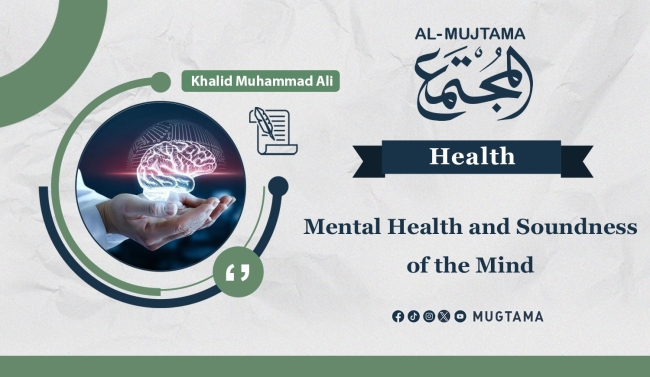The soundness of the mind and its ability to fully function in awareness and perception are closely tied to the mental health of an individual. Mental illnesses are fundamentally at odds with having a sound mind, which consequently hinders the capacity for producing thoughts that benefit the individual, their Arab surroundings, and humanity at large.
According to the World Health Organization (WHO), mental health conditions encompass mental disorders, psychosocial disabilities, and other psychological states associated with severe distress, impaired functioning, or self-harm risks. Individuals with mental health conditions are likely to experience diminished levels of psychological comfort.
Numerous research centers work diligently in this field to safeguard mental health from childhood through to the end of a person's life. Maintaining mental health ensures the preservation of a sound and beneficial mind that contributes positively to society. In this context, extensive research has been conducted linking mental health issues to the failure of the mind, particularly in areas like anger, depression, emotions, and other disorders. For instance, conditions such as obsessive-compulsive disorder (OCD) can completely derail cognition and thinking.
The Arab world requires comprehensive scientific plans to be implemented across an individual’s lifespan. These plans should focus on preemptive treatments to prevent mental illnesses and thus avert strain or damage to the mind. In doing so, individuals can remain beneficial to society rather than becoming detrimental to themselves and others.
Defining Mental Health
There are numerous definitions of mental health that connect the proper functioning of the mind with mental well-being, enabling individuals to achieve happiness and well-being. However, we can rely on a comprehensive definition provided by WHO, which states: "Mental health is a state of mental well-being that enables people to cope with the stresses of life, realize their abilities, learn well, and work well, and contribute to their community. It is an integral component of health and well-being, supporting our individual and collective abilities to make decisions, build relationships, and shape the world we live in."
Thus, the organization highlights the inseparable connection between sound decision-making, enjoying life, benefiting society, and the level of mental health. Achieving these outcomes requires the full engagement of cognitive abilities for the benefit of individuals and communities.
From a medical perspective, psychological disorders and stress affect specific brain areas, potentially causing atrophy, disruptions in neural cell formation, and a reduction in the size of certain brain regions. This can lead to memory problems, speech and expression difficulties, and learning impairments.
Impairment of the Mind
Extensive research and studies have linked anger—classified as a psychological ailment—to cognitive impairment. These findings indicate that anger can transform individuals into harmful members of society or emotional individuals incapable of contributing positively. Studies also warn about those who experience frequent and prolonged episodes of anger, emphasizing the danger they pose to their social environment. Anger is the antithesis of wisdom. Essential qualities for leadership and management include wisdom, experience, and the ability to avoid anger, allowing for sound decision-making free from emotional turmoil. These qualities are equally crucial for every mentally healthy individual within society to foster a community rooted in psychological well-being and capable of positively engaging with global civilization.
In the context of anger as a prevalent ailment affecting various aspects of life, the British Medical Journal published an article by Dr. Othman Al-Asfour, a member of the British Association for Anger Management and a psychology expert. He explained that anger is a form of temporary insanity that impairs the mind. When a person becomes angry, their blood pressure rises, and they struggle to breathe, inhaling only 20% of their usual oxygen intake during anger episodes compared to 80% during normal conditions. This lack of oxygen flow to the brain causes headaches and instability. He continued: "When anger takes over, hormones are activated, causing abnormal disturbances triggered by external factors such as hurtful remarks or specific incidents."
Our noble religion has not overlooked the impact of this psychological disorder on life and its dangers to society. Abu Hurairah reported that a man said to the Prophet (peace be upon him): “Advise me.” The Prophet replied: "Do not get angry." The man repeated his request several times, and the Prophet kept saying: "Do not get angry" (Sahih Bukhari). The Prophet advised him thus because anger leads to inappropriate speech, actions, and behaviors that conflict with reason and proper conduct, harming both the individual and their society.
Moreover, the Prophet (peace be upon him) offered additional advice on managing anger, saying: "When one of you becomes angry while standing, he should sit down. If the anger leaves him, well and good; otherwise he should lie down."
Fear, another mental health issue, obstructs rational thinking and affects decision-making. Excessive fear—whether of failure, authority, or various life events—directly impacts the mind's performance and hinders a person's integration into and contribution to society. Fear may also be a form of test from Allah, as He says: “And We will surely test you with something of fear and hunger and a loss of wealth and lives and fruits, but give good tidings to the patient.” (Al-Baqarah: 155), This highlights the profound impact of fear and the need for psychological and social remedies alongside faith-based patience to maintain mental health.
Sadness, resulting from the loss of a loved one or failure to achieve goals, can lead to isolation and hinder social interaction. Anxiety, often linked to emotional states and mood, may cause indecision and instability.
These negative emotions diminish an individual's capacity for rational thinking and elevate stress and anxiety levels, adversely affecting their overall quality of life.
The Arab world must identify and address mental health issues that hinder cognitive functioning. Preventative measures, such as raising awareness in schools, universities, and various media outlets, are essential. These efforts should stem from a firm belief that a sound mind is the key to societal progress and that safeguarding it is of utmost importance.
-------------------------------------------------------------


